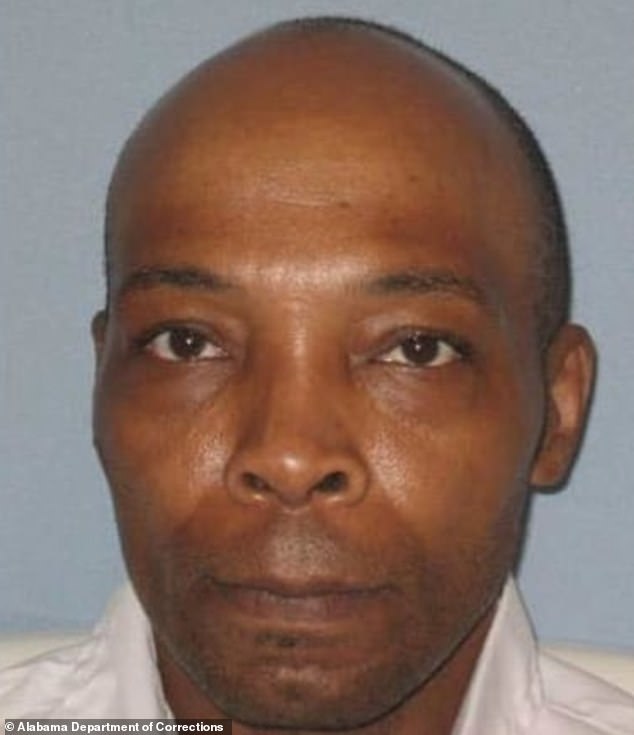The final words of an Alabama inmate executed for the 1998 murder of a father of seven have been revealed after he was unusually asked not to undergo an autopsy.
Keith Edmund Gavin, 64, was pronounced dead at 6:32 p.m. Thursday following a lethal injection — the southern state’s primary method of execution — at the William C. Holman Correctional Center, authorities said.
Gavin, the third inmate executed in the state this year and the 10th in the country, said, “I love my family,” just before he was injected with the sedative.
The Muslim prisoner continued with words that were not heard as he appeared to be praying with his spiritual advisor at his side.
He had one finger raised on both hands in what appeared to be the Islamic gesture meaning Allah is the only God.
Keith Edmund Gavin, 64, was executed Thursday at 6:32 p.m. by lethal injection. He was convicted of capital murder in the March 6, 1998, shooting death of deliveryman William Clinton Clayton Jr., 68.

William Clinton Clayton Jr., known as Bill, was fatally shot by Gavin as he was withdrawing money from an ATM downtown. He had just finished work and was collecting money to take his wife out to dinner.
The death-row inmate was convicted of capital murder in the March 6, 1998, shooting death of delivery driver William Clinton Clayton Jr., 68, when he stopped to withdraw money from a downtown ATM.
Clayton, known as Bill, had just finished work and was saving money to take his wife out to dinner, according to testimony during the trial.
After receiving a death sentence, Gavin spent years appealing many times to avoid punishment, but was never successful.
Alabama Governor Kay Ivey said, “Today, justice was finally served for Mr. Clayton’s loved ones. I offer my prayers for Mr. Clayton’s family and friends, who are still grieving his loss after so many years.”
At about 6:19 p.m., a corrections officer performed a consciousness check — saying his name, touching his eyelids and pinching his arms — which is done before the last two drugs are administered. Shortly afterward, he stopped breathing.
Before his execution, Gavin asked the state not to perform an autopsy on his body because of his devout Muslim faith.
While it is standard practice in the state of Alabama to perform an autopsy after an execution, Gavin asked through his lawyer that the act be banned after his death for religious reasons.

Before his execution, Gavin asked the state not to perform an autopsy on his body because of his devout Muslim faith. On Friday, the Alabama prison system agreed not to perform an autopsy. (Photo: William C. Holman Correctional Facility)
On Friday, the Alabama prison system agreed to forgo an autopsy.
“Mr. Gavin is a devout Muslim. His religion teaches that the human body is a sacred temple that must be kept intact,” his lawyer previously wrote.
‘As a result, Mr. Gavin sincerely believes that an autopsy would desecrate his body and violate the sanctity of keeping his human body intact.
‘Based on his faith, Mr. Gavin strongly opposes an autopsy being performed on his body after his execution.’
The death penalty, also known as capital punishment, is generally reserved for especially heinous crimes in which a victim dies, but each state can determine what specific circumstances make a murder eligible for a death sentence.
During the attempted robbery more than two decades ago, Gavin was on parole in Illinois after serving 17 years of a 34-year sentence for murder, according to court records.
Prosecutors said the man shot Clayton, pushed him into the passenger seat of the SUV he was driving and drove away.
An officer testified that he began chasing the truck and its driver, a man he later identified as Gavin, who shot him before fleeing into the woods.
A jury convicted Gavin of murder and voted 10-2 to recommend the death penalty, which a judge imposed. Most states now require a jury to unanimously agree to impose the death penalty.

Gavin, the third inmate executed in the state this year and the 10th in the country, said, “I love my family,” just before he was injected with the sedative. (Photo: Alabama lethal injection chamber file photo)
In 2020, a federal judge ruled that Gavin had ineffective counsel at his sentencing hearing because his original attorneys failed to present more mitigating evidence of Gavin’s violent and abusive childhood in Chicago.
The inmate grew up in a “gang-infested housing project in Chicago” where he lived “in overcrowded homes that were in poor condition,” said U.S. District Judge Karon O. Bowdre.
Bowdre added that Gavin “was surrounded by drug activity, crime, violence and unrest.”
A federal appeals court later overturned the decision allowing the death sentence to stand.
“There is no question about Gavin’s guilt for this heinous crime,” Alabama Attorney General Steve Marshall said Thursday.
Clayton, a Korean War veteran, was a father of seven children and continued to work even after retiring from a railroad company, according to his obituary published by The Birmingham News.

As of January 2024, there are 24 states that have the death penalty and 23 that do not, while three others have a moratorium on it.
His son, Matthew Clayton, 54, who witnessed the execution, said his late father was “a piece of Americana” who sometimes worked two jobs to support his family.
‘He was a good man. He left behind children and a wife who miss him, and an extended family who mourn his loss.
“It’s very unfortunate that his final years were taken from him in such a brutal way,” Matthew said, adding that his father “did not deserve to die this way.”
Matthew said USA Today who remembers his father as a “pretty big man” who was also “a bit of a gentle giant.”
He said his mother, now 94, lives independently and is “very healthy and very vibrant.”
“It’s truly been a blessing to have her around for so much of my life, particularly since my father passed away when I was so young,” Matthew said.

